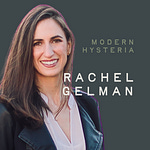Hi, friend. It’s Micah with another episode of Modern Hysteria, your podcast and newsletter with real talk about the taboos of women’s health.
This week we’re saying the quiet parts OUT LOUD about why the postpartum chapter of our lives often feels overwhelming and isolating (how did we get here??) and how systemic factors — like lack of support or maternity leave — exacerbate postpartum anxiety and depression.
Time stamps
[05:55] Becoming a postpartum doula
[07:12] What is IVF?
[11:26] Comparing postpartum care: Scandinavia vs. North America
[15:46] Prenatal genetic testing
[12:59] What evidence-based postpartum care really means
[18:48] What does a postpartum doula do?
[23:18] Is postpartum care a luxury?
[26:12] The cult of good motherhood
[28:42] Systemic gaps in postpartum care
[32:06] What new moms really need
Top 3 takeaways
→ The mainstream culture of early motherhood in the US and Canada fails new moms.
Unlike places like Sweden, where moms get paid time off, free nurse visits, and affordable childcare, many moms here feel alone and overwhelmed after giving birth (which can contribute to perinatal mood disorders).
→ The “cult” of good motherhood can make postpartum mental health struggles worse.
Society puts a lot of pressure on moms to do everything perfectly (especially since the advent of social media). This stress can lead to or exacerbate postpartum anxiety and depression.
→ Having a support system to ready to go before birth can really help.
Whether it’s hiring a postpartum doula, getting help from family and friends, or talking to your healthcare professionals, having a plan for support can make postpartum life - and information overload — easier (we break down Kelsey’s list of action items in Part 2!)
Do you wish you had a postpartum doula? Got FOMO? Tell me:
The guest expert
Dr. Kelsey Marr (PhD) quit her job as a birth researcher in 2023 to become a full-time doula. She helps expecting and new parents navigate pregnancy, birth, and postpartum by helping them find evidence-based information, and build their research skills and confidence to make their own best birth/postpartum choices.
📍 Location: Halifax, Nova Scotia, Canada
🆓 eBook: “Is This Normal?” Evidence-Based Guide to Your First Trimester of Pregnancy
👩🏼💻 Blog: Expecting Evidence
📱 Social: @collectivecarehfx
Resources and links 🔗
Mentioned in this episode:
Touched Out: Motherhood, Misogyny, Consent, and Control by
The Danish Way of Parenting by
and Iben SandahlSome of my fav Scandinavian baby brands: Liewood; Småfolk; Bibs; Stokke
Q&A from the Episode
What does a postpartum doula do?
KM: A postpartum doula is a trained expert in postpartum care. So they are a non-clinical professional. I don't work in a hospital as a postpartum doula. I'm not a nurse or a doctor. I can't diagnose anything.
What I do is offer care to birthing people and new families from an educational level through a practical support level, emotional level, and a community level.
Are postpartum doulas a luxury?
KM: For a lot of people, it is a luxury because I am somebody who you end up paying for my time and my expertise. I know in Canada and the United States, there are insurance companies that will cover postpartum doula services. So that's an option for some people.
But the reality is that even though there are doulas who do this work on a volunteer basis, not everybody has access to it.
What do you wish all new moms had after childbirth?
KM: I wish every new parent had community—really like very hands-on, practical, open-hearted community. And that doesn't mean I wish everybody had close familial connections or close friends.
Community can look like a lot of different things. Whether that's finding your support team of professionals before you go into postpartum... a therapist, a doula, a pelvic physio —all of these professionals can take things off your plate in those early months.
🤫 ML: Stay tuned for an upcoming episode on pelvic floor dysfunction and incontinence!
TL;DR
New moms in the U.S. and Canada often struggle with little support after having a baby, which can lead to feelings of isolation and mental health challenges like postpartum anxiety and depression. This episode explores how gaps in postpartum care, unrealistic societal expectations, and the pressure to be a "perfect mom" make it even harder for moms to get the help they need.
I hope you like this episode, friend.
Kelsey will be back next week with Part 2 of our convo on postpartum mental health and practical advice for showing up for the new parents in our lives.
Up next:
People-Pleasing x Libido with
Shame x CPTSD with Grace Bithell
Narcissistic Abuse x Telling Your Story with
Talk soon —
Micah
















Share this post